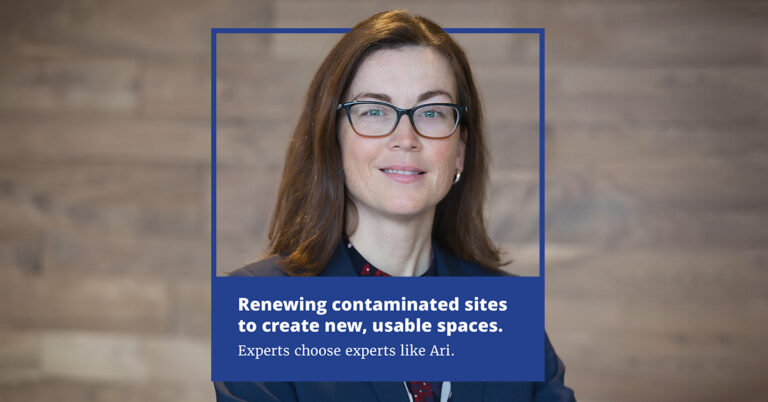Q&A with Ariadna Cheremeteff, Regional Discipline Leader, Environmental

How long have you been with Colliers Engineering & Design (CED)? Tell me about your role.
I’ve been with Bergmann, now Colliers Engineering & Design, just over five years. I’m the Regional Discipline Leader, Environmental for New York. I manage a team of people throughout New York that provides support for all our remediation and contamination projects. My work includes anything having to do with environmental remediation, contamination, compliance, regulations, waste management, construction oversight, reporting, data analytics, Brownfield cleanup sites, Superfund sites, and due diligence. We also provide support for remediation design for large-scale cleanup projects.
What attracted you to the A/E industry, and what led you to the environmental side of the business?
I’ve always been interested in the environmental side of engineering. I initially went to college for civil engineering. While there, I realized that the environmental component was more interesting to me, pairing my interest in site civil work with cleanup for reuse of previously unusable sites. That intrigued me. With civil engineering, you’re constructing and making functional use for roadways, bridges, land, and site development, etc. The environmental side takes that further. We take a contaminated, unusable space and make it usable.
What is your favorite thing about your job?
I have an amazing team. I love working with them. They bring a wealth of knowledge, support, and drive that really helps us achieve the goals we want to achieve together: Providing our services to help our clients clean up their sites.
What motivates or inspires you to come to work every day?
I just love what I do. I love that every project is different and it’s a new challenge every day. There’s always something new to learn. I’m 18+ years in the industry, and I still learn something new every day. It’s not cookie cutter. Every day provides me with a new critical thinking challenge, so it’s not the same rote work over and over, and I love that.
What challenges have you had to overcome as a woman in the A/E industry?
During my education, I fortunately did not have any gender-related challenges. I saw an even balance between men and women through the environmental engineering program. The civil side, though, was heavily skewed towards men.
When I went into the workforce, however, it was very different. It was a very male-dominated environment, and I felt as if I was pigeonholed by that.
As a young woman out of college, working with all men was a little bit challenging, and I had to learn to stand up for myself. I already had a strong backbone. I came from the trucking industry, which was my career before I went back to school to become an environmental engineer. I didn’t think I’d need that same toughness in a professional setting, but I did. Sometimes I still do, but less so now than 18 years ago.
The other issue I had was being taken seriously. Sometimes I felt like the solutions I brought to the table were dismissed. If a male colleague came up with the same idea or if they took my idea and presented it as their own (which has happened), they were applauded. And that was hard for me. But that made me speak up and advocate for myself.
It’s important to me to teach self-advocacy to the women that I work with and those who are coming into the industry. Be strong about what you know. Stand your ground. If you don’t know something, ask, or say you don’t know and you’ll find out, but don’t let someone steamroll you.
Have you seen less of that attitude compared to when you started?
I think so. I’m not the twenty-something woman coming on to a site. I’m “seasoned.” I’m coming in with experience and a stronger attitude, which exudes more confidence. People understand I’m the subject matter expert and don’t question me just because I’m a woman.
The other thing is all the relationships I’ve built over the years. I know so many of the construction firms, contractors, and supervisors on these sites. Often, we already have a working relationship, and they know that we work well together. We have an established history, and there’s a level of respect that comes with that, so that helps too.
Is there a message you want to send to women aspiring to work in the A/E industry?
I feel that I am seeing more women in this industry, and I would love to see even more. It makes me really excited about the future of environmental engineering. I think it’s a field that needs some more diversity. Even though I have an almost entirely female team, that’s rare. I’m looking for additional employees throughout the state, and what I am seeing now is that most applicants are women, and that is exciting. I love seeing that more women are applying for these roles. Women are eager to take on the field portions and be on construction sites. They are out in the field, getting their hands dirty, gaining the experience they need to excel in the industry.
What is the next personal goal you’d like to achieve?
I want to get my Professional Engineer (P.E.) license. It’s a personal goal to obtain it. It’s been one of those things I put on the back burner. I just need to do it.
What is the next accomplishment that you’re trying to achieve professionally?
I would love to expand my group throughout the Northeast. In addition, I would love to see more career advancement for some of the people on my team. I’ve seen several of them advance in their careers, but I want to see them go even further.
Interviewed by Mark Bean, Senior Project Manager, Water/Wastewater

Comments are closed.